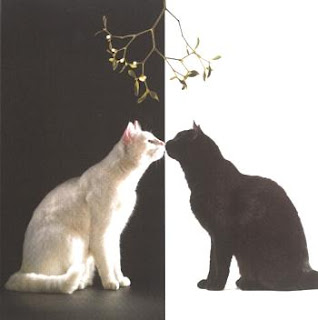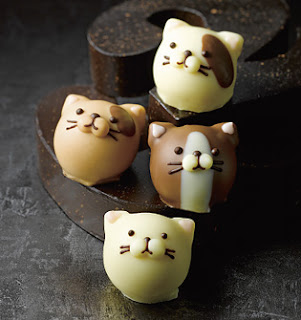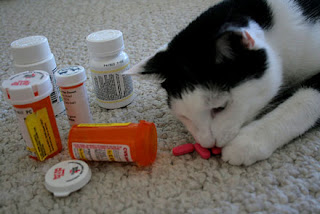Many people decorate their homes with festive holiday plants that are gorgeous to look at, but may be deadly if eaten. In addition, many are busy baking and cooking in preparation of big family meals together. Since we’re so busy, sometimes we may not notice if our mischievous cat is trying to snack on something she shouldn’t.
Here are some of the top
holiday items that cats love to eat (but shouldn’t!):
Plants
 |
| Mistletoe should be kept well out of cats' reach |
Holiday plants vary in their
toxicity. Lilies (all of the Lilium family and Hemerocalis
species), amaryllis bulbs
and mistletoe are the most dangerous. If you or anyone in your
household suspects that your cat may have ingested any part of a lily, no
matter how small, please seek immediate veterinary attention. Hesitation
may mean the difference between life and death for your cat! If more than 6
hours pass between lily ingestion and treatment, your cat’s chance of recovery
decreases from fairly good to guarded-to-poor, and you can expect some
long-term kidney damage.
There
are several species of mistletoe including Phoradendum and Viscum
– some of which are highly toxic and some of which are less so. Any type of
mistletoe ingestion should be brought to the attention of your veterinarian.
 |
| Cats should be monitored around holly |
(for
more about Holly toxicity)
Jerusalem
cherry (Solanum pseudocapsicum) is a decorative species of
nightshade with bright red berries that are poisonous.
Poinsettias (Euphorbia) have gotten a bad rap as an
extremely poisonous plant due to an urban legend dating back to 1919.
They do cause some intestinal upset, but rarely cause death. Pine needles and
Christmas cactus usually
cause irritation and intestinal upset but are less toxic. The most common signs
of plant toxicity are: vomiting, diarrhea, abdominal pain, and excessive
salivation (drooling).
 |
| Poinsettias aren't as bad as many people think |
Exposure
to plants in the Lily family is far and away the most serious holiday threat. Dr. Bailey has seen more deaths in cats due to this, than all the other toxic plants
combined.
Some non-toxic winter plants
that you can safely place in your home include: Christmas palm (Veitchia
merrillii), Christmas orchid (Cattleya trianaei), Christmas dagger
fern (Polystichym spp), and Mistletoe cactus (Thipsalis cassutha).
Foods
 |
| Cats and the onion family don't mix |
Drinks with milk or cream such as
alcoholic eggnog are a concern both because most cats are lactose intolerant
and because cats are very sensitive to alcohol due to their small size.
Even small amounts of alcohol can be fatal.
 |
| Goncharoff cat-shaped chocolates |
You should refrain from giving bones
to your cats. Unlike dogs, cats do not have the instinct to gnaw on bones – and
even dogs can damage or prematurely wear down their teeth with too much
bone-chewing. Small bones can cause choking or bowel obstructions. Ingestion of
broken bones can cause perforations of the intestinal tract, so if you offer
turkey meat, make sure it is boneless.
In addition, the herbs and
spices that the turkey or chicken is cooked with can be a problem. Sage
is an herb that cats are extremely sensitive to, and can cause an upset stomach
or depression of the nervous system. Also, as above, onions and other members
of that family can cause anemia. If you want to offer your cat turkey, cook up
some unseasoned bits on the side, rather than sharing from the family’s bird. It
is doubtful that cats can taste the spices the same way humans can, anyway.
Medications
 |
| Many of the poisoning cases we see are due to pill ingestion |
Cats lack some liver enzymes and metabolize many medications poorly; one Tylenol or Ibuprofen can be fatal to a cat. If your cat is on medications for her own health issues, ingesting additional human medications may interact with those she has already taken with devastating results.
If you think your cat has ingested someone's medication, please call a veterinarian right away. Have the pill vial handy while you are on the phone and bring it with you to your appointment so that you can give all the important information to the doctor about what kind of medication it was, the dose and an estimate of how many pills were in the bottle. Make sure that you are also aware of all the medications your cat normally takes and when the most recent dose was given. If your cat has ingested someone else’s medication and is due for a dose of their own medications, DO NOT give the normal medications until you have spoken with your veterinarian.
Most of the poisoning cases we see at Exclusively Cats Veterinary Hospital are due to improper medication ingestion - either cats eating dropped pills from a human or other pet in the house, accidental overdoses when more than one family member gives the medication on a busy or chaotic day, or from mixed up medications such as a dog parasite product being accidentally applied to a cat.
Return to the First Day of Christmas


Nice articles and your information valuable and good articles thank for the sharing information Chicken liver cat snack bites
ReplyDelete